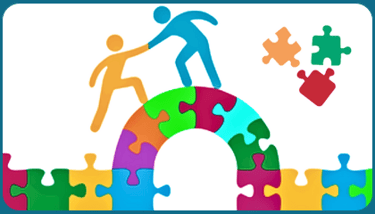Having a Better Life Means Having a Better Vision: You Get What You Accept!
Freedom is learning to see a way out of the matrix!
ENGAGE!
The Resilient Communities Movement
12/12/20245 min read


The Degradation of Society: Identifying the Issues
The decline in societal value and well-being has become a pressing concern in contemporary discourse. Several interrelated factors contribute to this degradation, each exacerbating the others and leading to a pervasive sense of disillusionment among individuals. At the forefront of this concern is the breakdown of the cultural framework that once provided communities with a shared sense of purpose and identity. Today, many cultural narratives prioritize materialism and superficial engagements over meaningful connections and communal responsibilities.
Moreover, the inadequacy of the education system plays a critical role in shaping the values and capabilities of future generations. Educational institutions often emphasize rote memorization over critical thinking, stifling creativity and intellectual curiosity. This limitation not only undermines the potential of individuals but also perpetuates a cycle of ignorance, where students exit the system without a comprehensive understanding of their society or the challenges it faces. The inability to critically evaluate information further complicates this issue, leading to the acceptance of manufactured beliefs that dominate the discourse.
Corporate influences also significantly contribute to societal degradation. The pursuit of profit often overshadows ethical considerations, leading to the promotion of ideologies that prioritize individual gain over collective well-being. Advertising and media frequently perpetuate unrealistic standards and expectations, creating a society that equates success with wealth and status. This environment fosters a disconnect between personal fulfillment and societal harmony, leaving individuals to grapple with deep existential questions that go unanswered.
Furthermore, it is essential to recognize the pervasive ideologies that cloud our understanding of the real issues affecting society. These manufactured beliefs skew perceptions, making it challenging for individuals to identify and address the underlying problems. As we strive for a better life, acknowledging and addressing these various factors is crucial in crafting a vision for a more cohesive and thriving society.
Breaking Through the Veil: The Importance of Awareness
To navigate life effectively, it is paramount for individuals to cultivate a clearer vision of their surroundings and themselves. This clarity forms the foundation of self-awareness and critical thinking, allowing one to discern the often-invisible frameworks constructed by societal norms and expectations. The modern world is filled with preconceived notions that can limit one's perspective, creating a veil that obstructs a deeper understanding of our shared human experiences.
Critical thinking plays a crucial role in fostering awareness. By actively questioning the status quo, individuals can challenge accepted beliefs that may not resonate with their personal truths. This process is essential for breaking free from the constraints imposed by external pressures, whether they originate from cultural, social, or familial expectations. When one develops the ability to think critically, they increase their capacity to see beyond the superficial and access a richer, more nuanced comprehension of reality.
Self-awareness complements critical thinking by encouraging individuals to reflect on their own values, biases, and motivations. It is through this introspection that one can recognize how their perceptions are shaped by external forces and how these perceptions may need recalibrating for a more authentic existence. Moreover, self-awareness fosters empathy, creating a bridge to understand the diverse experiences of others within the community.
As individuals break through the veil of misunderstanding and societal conditioning, they begin to discover the potential for positive change—not just within themselves but across their communities. This elevated state of awareness can inspire proactive solutions to pressing issues, as individuals recognize their unique role in driving transformation. By embracing awareness and rejecting complacency, people can forge a path toward a more fulfilling life, enriched by intentional choices and conscious actions.
Creating a New Vision: Collaborative Efforts for Change
In the quest for a better life, fostering a new vision requires united efforts from both communities and individuals. Collaboration is fundamental in facilitating innovative solutions that address the multifaceted challenges society faces today. By coming together, people can share ideas, resources, and experiences that contribute to a progressive agenda rooted in shared values and goals.
To begin this journey, communities must establish clear, common objectives that reflect a collective aspiration for improvement. This process can be initiated through town hall meetings, focus groups, and online forums, where diverse perspectives and voices can be heard. Engaging a wide range of stakeholders—from local residents to business leaders and policymakers—ensures that the vision crafted is inclusive and representative of the community’s needs.
Open dialogue forms the cornerstone of collaboration, allowing individuals to articulate their thoughts and participate actively in shaping the future. Establishing trust and respect among participants is imperative, as it encourages honest discussions and fosters a safe space for creativity. Examples of successful community initiatives abound, such as neighborhood clean-up programs that not only beautify the area but also bring residents together to connect and share experiences. These grassroots movements demonstrate that collective action can effectively challenge societal degradation and promote a sense of ownership and belonging.
Furthermore, collaboration can extend beyond local borders, with inter-community partnerships multiplying resources and amplifying the impact of initiatives. By learning from each other’s successes and failures, communities can refine their strategies to better achieve their vision. Ultimately, it is through these collaborative efforts that a human-centered approach to progress emerges—one that prioritizes the wellbeing and empowerment of each individual and the community as a whole. This transformative journey does not happen overnight, but with sustained efforts and goodwill, a brighter, more inclusive future is achievable.
Implementing Change: From Vision to Reality
Implementing change is a vital step in transforming a newly developed vision into tangible outcomes. A systematic approach to translating ideas into actionable plans can foster individual and communal engagement, ultimately leading to meaningful change. To initiate this process, it is essential to identify available resources that can support the implementation of the vision. These resources may include fiscal support, educational opportunities, or community partnerships that bolster the initiative.
Once resources are identified, setting attainable goals becomes imperative. These goals should be specific, measurable, achievable, relevant, and time-bound (SMART). By establishing clear objectives, individuals and groups can create a roadmap that guides their efforts. For instance, if the vision includes improving local community health, a set of foundational targets such as organizing bi-weekly workshops or creating a monthly health newsletter can spearhead progress. The clarity provided by structured goals enables participants to focus their efforts and track their advancements over time.
Fostering accountability among participants is a key element in the successful implementation of any vision. Encouraging collaboration and establishing a support network can enhance motivation and ensure adherence to the set goals. Regular check-ins and progress assessments can facilitate open communication, allowing participants to feel supported in their endeavors. By creating an environment where individuals hold each other accountable, collective commitment to the vision strengthens, ultimately reinforcing persistence in the face of setbacks.
Furthermore, resilience and adaptability are crucial for overcoming challenges encountered during the implementation process. Embracing flexibility allows individuals and teams to navigate obstacles and reassess strategies as needed. Cultivating a mindset that views challenges as opportunities for growth will empower participants to remain steadfast, illustrating that positive change is attainable through dedication and collaboration. By committing to this process, communities can turn visions into reality, creating lasting impact.
Thoughts on a human future... ~ The Resilient Communities Movement
The Resilient Community Movement
In today's ever-changing world, the importance of fostering resilience within neighborhoods and communities cannot be overstated. By facilitating connections among residents, we empower individuals to share their stories and experiences, creating a strong support network. This collaborative spirit not only enhances the well-being of community members but also amplifies their voices, ensuring that their unique human needs are recognized and addressed.
Contact and Connect
info@reseco.org
© 2024. All rights reserved.
